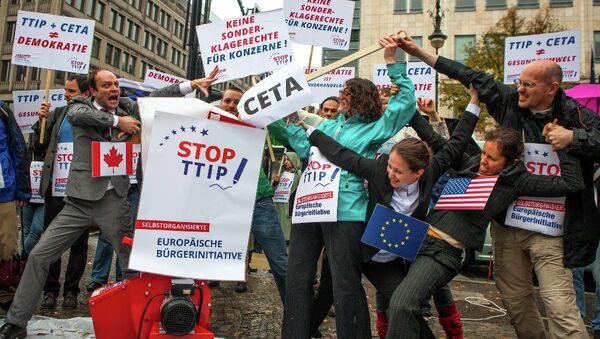Although the Comprehensive Economic and Trade Agreement (CETA) trade deal between the EU and Canada was passed through the European Parliament, it still has to be ratified by all the 28 EU member states' parliaments.
I welcome today's EP vote in favour of EU-Canada free trade agreement #CETA. Strong signal that EU welcomes free and fair trade.
— Donald Tusk (@eucopresident) 15 February 2017
A letter signed by 106 leftist members of France's National Assembly said the deal implied a transfer of sovereignty by signatory countries "beyond what they agreed upon in favor of the EU." The deputies had previously circulated a legal opinion from campaign group Foodwatch, which said CETA violated parts of the French constitution.
The CETA deal — like its counterpart US-EU trade deal the Transatlantic Trade and Investment Partnership (TTIP) has proven controversial because of differences between regulatory standards in the EU and Canada and the US.
.@BiljanaBorzan #CETA will undermine EU #GMO laws, no hidden GM contamination in our food! #CETAtuesday pic.twitter.com/K7vMeSFDxx
— Stop TTIP (@eci_ttip) January 12, 2017
Opponents of both trade deals say that the EU has strict standards on protecting its citizens against toxic chemicals, hormone-ridden beef, hidden GMOs and all of the other harmful substances. They believe that a merged regulatory regime would drive down environmental and health standards as well as workers' rights.
In the EU, under a system known as Geographical Indications, France and Italy have negotiated 42 exemptions each to protect many of their products including champagne, brie and parmesan cheese and opponents fear that CETA will put these at risk of imitations products being imported from Canada.
Dispute Resolution
At issue is the ability of Canadian companies to be able to sue EU governments through an Investment Court System (ICS), which is a separate commercial tribunal system from member states' judicial systems.
Once an agreement is in place, if a company is able to sell its products in its home territory, but is prevented from selling it in a partner country — because of conflicting regulatory conditions — then the company may invoke the ICS provisions taking the matter to a trade tribunal.
A week after EU Parliament's ratification of #CETA, it faces a constitutional challenge. Read: https://t.co/8dQ7XsyLLE pic.twitter.com/zWjFM5CnXt
— frackfree_eu (@frackfree_eu) 22 February 2017
"It allows claims to be made only by foreign investors, is based on extremely broad foreign investor rights, and abrogates from the basic international law principle of prior exhaustion of domestic legal remedies. Greens are against such an unnecessary parallel system of justice which prioritizes private foreign investment over domestic public interest," a resolution from the Green group in the European Parliament says.


